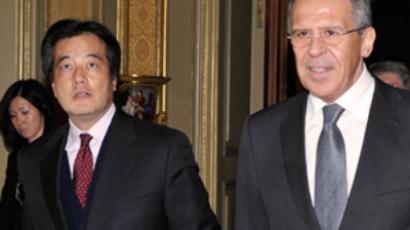Seoul-Pyongyang tension affects whole Asia-Pacific region – Moscow
Tension between North and South Koreas keeps growing. At a major security summit in Singapore, Russia has called for diplomacy to be stepped up in order to stop the row getting out of control.
South Korea has accused its neighbour of sinking one of its warships and North Korea has criticized South Korea for calling on the UN Security Council to introduce sanctions.
The situation on the Korean peninsula has been high on the agenda at the summit in Singapore, the biggest Asia-Pacific summit dedicated to the security issues in the region.
All the parties involved in this conflict have had an opportunity to share their suggestions on how to resolve the conflict.
South Korea’s Prime Minister and the US Secretary of Defense have both called on North Korea to admit what they call “military provocations”.
Meanwhile, Russian Deputy Prime Minister Sergey Ivanov has stressed that the international community has to be very careful when accusing North Korea, as too much pressure can make a confrontation more likely.
“Let’s assume sanctions are imposed – another round of sanctions. What will they achieve? I think nothing. I think this will only lead to further deadlock. It’s time for diplomats to do their job,” Sergey Ivanov said.
Russia has come to the security summit with its own experience in dealing with global challenges such as terrorism, extremism and drug trafficking.
Sergey Ivanov has called on the international community to look at this experience and to learn from it. He particularly spoke about Afghanistan.
“However ambiguously the Soviet military presence in Afghanistan might be viewed now, nobody disputes the fact that during that period, Afghanistan produced almost no drugs,” he said.
Soviet troops were deployed in Afghanistan between 1979 and 1989 and drug flow was minimal because the forces aggressively eliminated poppy production, Ivanov explained.
The minister urged NATO forces to crack down harder on the drug business, especially focusing on Afghanistan’s social and economic development. This is needed to give poppy farmers an alternative, Ivanov said.
"If you burn down a poppy plantation, you need to invest in conventional agriculture," Ivanov said. "A lot should be done to start very primitive social and economic life in Afghanistan."
"If we don't do that, any military presence will be in vain," Sergey Ivanov said.
He also added Russia will continue with its help to the US forces and its allies in the region, providing logistics and intelligence in Afghanistan, but will “never again” send its troops to the region.
"Never again will a Russian soldier enter Afghanistan," the minister said. "It's like asking the US whether they will send troops to Vietnam. It's totally impossible."













